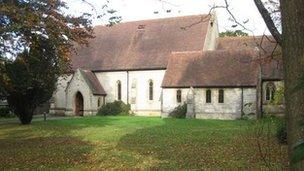DNA marking grease used to fight metal theft in Dorset
- Published

The DNA marking grease has been applied to St John the Baptist Church in Broadstone
A DNA marking grease has been applied to buildings in a Dorset town to help police trap metal thieves.
The grease contains microdots which bear a unique reference number. It is transferred to skin and clothing so raiders can be linked to thefts.
St John the Baptist Church, in Broadstone, which was targeted by lead thieves on two successive nights in April, has had the grease applied.
Dorset Police said continued metal theft attempts would now be "foolish".
As well as capturing thieves, the grease, funded by the local Community Safety Partnership (CSP), also helps police trace stolen metal.
Sgt Andy Jenkins, of the Safer Neighbourhood Team, said: "We have identified a number of properties where we believe this method will either stop the crime occurring or give us a high chance of capturing those foolish enough to continue with these types of theft.
"On some sites, such as Upton House and St John the Baptist Church in Broadstone, there are clear signs indicating the presence of the grease. At other sites, the first indication to any thief will be when police officers point it out to them just prior to their arrest."
Congregation members at St John the Baptist Church have been on a night-watch after £10,000 of lead was stolen from the roof on 18 April and 19 April.
Thousands of pounds of damage to the roof left water pouring into the church.
- Published2 May 2012
- Published29 April 2012
- Published25 April 2012
- Published17 April 2012
- Published1 April 2012